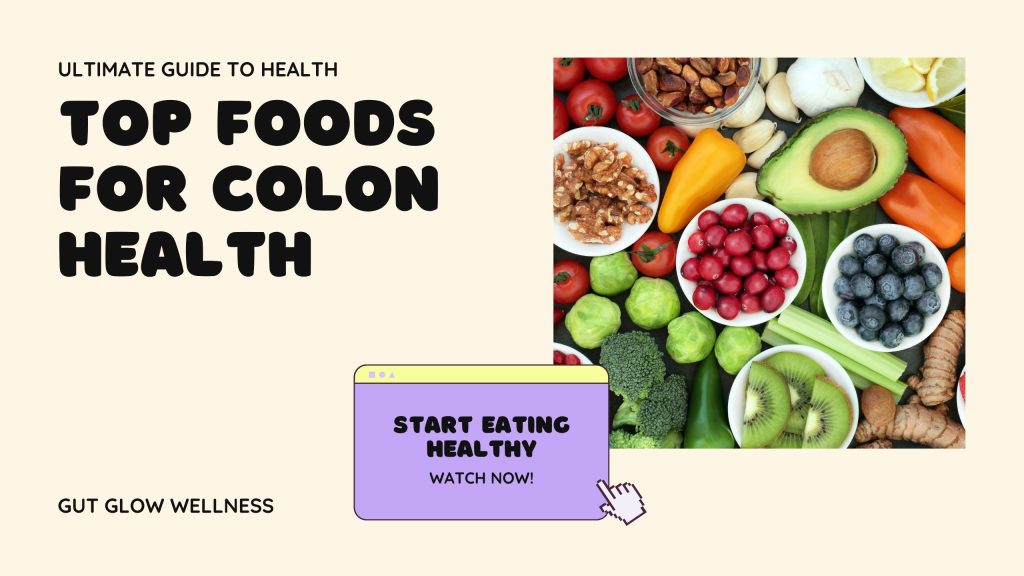Your colon is more than just a part of your digestive system—it’s a cornerstone of your overall health. A well-functioning colon supports digestion, nutrient absorption, and waste elimination. But did you know your diet plays a crucial role in keeping your colon healthy? Let’s dive into the best foods that can help you maintain a happy, healthy colon.

Understanding Colon Health
The Role of the Colon in Digestion
The colon, or large intestine, is responsible for absorbing water and electrolytes from digested food and forming solid waste. A healthy colon ensures smooth digestion and elimination.
Common Issues Related to Poor Colon Health
Issues like constipation, bloating, and even colorectal diseases can arise from poor dietary choices, lack of exercise, and stress.
Benefits of a Colon-Friendly Diet
Eating the right foods can reduce inflammation, improve digestion, and even lower the risk of colorectal cancer.
Key Nutrients for Colon Health
Dietary Fiber
Fiber is essential for promoting regular bowel movements and feeding good gut bacteria. It also helps prevent constipation and reduces the risk of colon disease.
Probiotics and Prebiotics
Probiotics introduce beneficial bacteria to your gut, while prebiotics feed these bacteria, creating a balanced gut microbiome.
Antioxidants and Polyphenols
These nutrients fight inflammation and protect cells in the colon from damage.
Best Foods for Colon Health
High-Fiber Foods
Whole Grains: Oats, quinoa, and brown rice are excellent sources of fiber that aid digestion and improve bowel health.
Legumes: Beans, lentils, and chickpeas are packed with fiber and protein, making them a great addition to your diet.
Fruits and Vegetables: Apples, pears, carrots, and broccoli are fiber-rich options that also provide essential vitamins.
Probiotic-Rich Foods
Yogurt: Choose plain, unsweetened yogurt with live cultures to support gut health.
Kimchi and Sauerkraut: These fermented foods are loaded with probiotics that balance your gut bacteria.
Kefir: This fermented milk drink is another excellent source of gut-friendly probiotics.
Foods High in Antioxidants
Berries: Blueberries, raspberries, and strawberries are antioxidant powerhouses that protect colon cells.
Leafy Greens: Spinach, kale, and collard greens are full of fiber and nutrients that reduce inflammation.
Nuts and Seeds: Almonds, flaxseeds, and chia seeds provide healthy fats and antioxidants.
Healthy Fats
Avocados: Packed with monounsaturated fats and fiber, avocados are a colon-friendly superfood.
Olive Oil: Known for its anti-inflammatory properties, olive oil supports overall gut health.
Fatty Fish: Salmon, mackerel, and sardines are rich in omega-3 fatty acids that combat inflammation.
Foods to Avoid for Better Colon Health
To protect your colon, steer clear of these dietary culprits:
- Processed Meats: Linked to an increased risk of colorectal cancer, processed meats like bacon and sausages should be consumed sparingly.
- Refined Sugars and Grains: These can promote inflammation and disrupt gut bacteria.
- Excessive Alcohol: Alcohol irritates the digestive tract and may lead to long-term colon damage.
Simple Tips for a Colon-Friendly Diet
- How to Balance Your Meals: Include a mix of fiber, protein, healthy fats, and probiotics in every meal.
- Hydration and Its Importance: Drinking plenty of water aids digestion and keeps your colon functioning smoothly.
- The Role of Portion Control: Overeating can strain your digestive system, so stick to moderate portions.
Lifestyle Habits for a Healthy Colon
Regular Exercise
Physical activity promotes healthy digestion and reduces the risk of colon disease.
Stress Management
High stress levels can disrupt your gut health. Practices like meditation or yoga can help.
Importance of Routine Health Screenings
Regular colonoscopies and check-ups can detect potential issues early.
Conclusion
A healthy colon starts with the right foods and habits. Incorporate fiber-rich foods, probiotics, and antioxidants into your diet while avoiding harmful processed foods. Combine this with a balanced lifestyle, and you’ll be well on your way to maintaining optimal colon health.
FAQs
- What are the best drinks for colon health?
Water, green tea, and kombucha are excellent choices for hydration and gut health. - Can a poor diet lead to colon cancer?
Yes, a diet high in processed foods and low in fiber can increase the risk of colorectal cancer. - How much fiber should I eat daily for a healthy colon?
Adults should aim for 25–30 grams of fiber daily for optimal colon health. - Are there specific foods that cleanse the colon?
High-fiber foods like fruits, vegetables, and whole grains naturally cleanse the colon by promoting regularity. - Can improving colon health boost overall well-being?
Absolutely! A healthy colon enhances digestion, boosts immunity, and supports better energy levels.
Leave a Reply